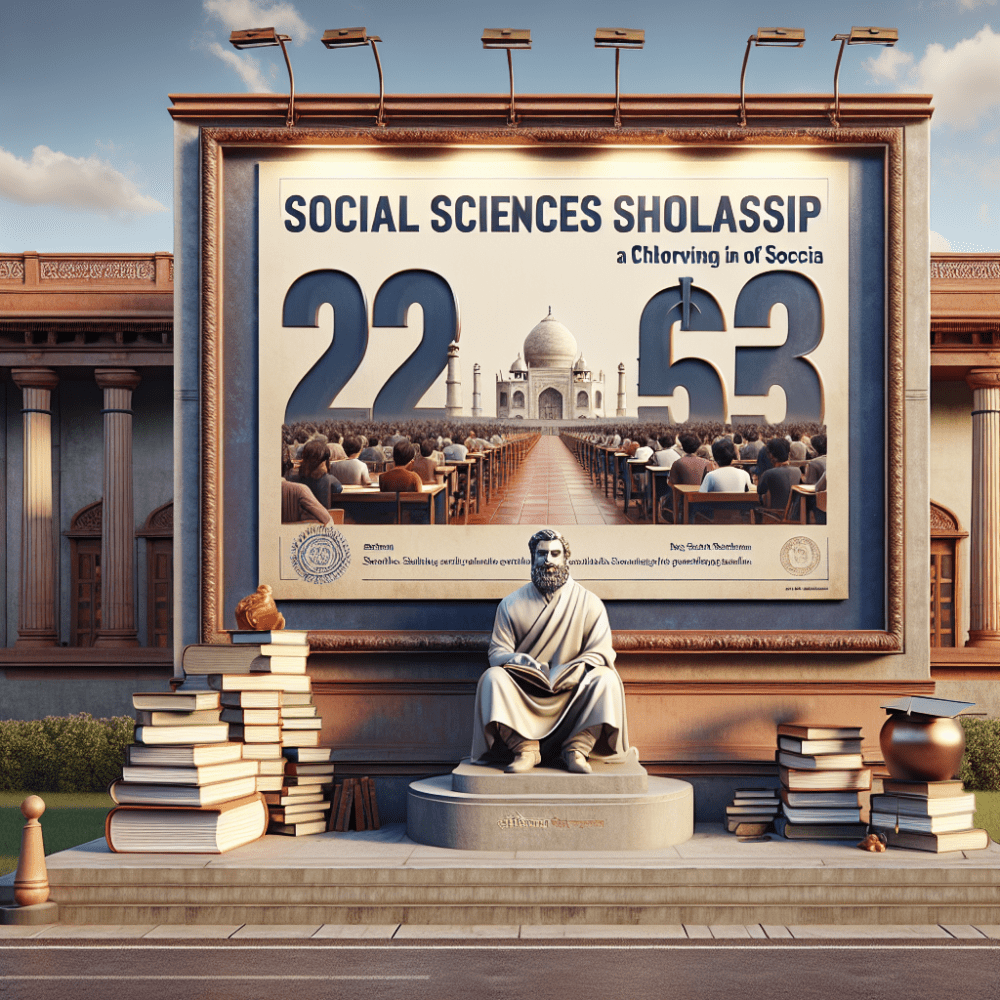
Navigating the Maze: My Unforgettable Journey to Social Sciences Scholarships
I remember a time, not so long ago, when the dream of studying social sciences felt like gazing at a distant star – beautiful, inspiring, but utterly out of reach. My heart was set on understanding human societies, the intricate dance of cultures, the mechanics of power, and the whispers of history that shape our present. I wanted to dive deep into sociology, perhaps political science, or even anthropology, but the glaring reality of tuition fees and living expenses loomed like an insurmountable mountain. My family, bless their hearts, had always encouraged my academic pursuits, but financial resources were stretched thin. It was a crossroads many aspiring scholars face, a moment where passion clashes with practicality.
I could have given up. I could have chosen a path that seemed more "lucrative" or "practical" in the immediate sense, silencing the persistent curiosity that hummed within me. But something inside me refused to let go. I believed, with a stubborn optimism, that there had to be a way. And that way, I soon learned, was paved with scholarships.
Now, if you’re reading this, chances are you’re standing at a similar crossroads, or perhaps you’re just starting to peek down the path I eventually walked. Let me tell you, it wasn’t a straight, well-lit road. It was more like a winding, sometimes overgrown trail through a dense forest. But with every step, every wrong turn, and every small victory, I learned something invaluable. And today, I want to share that journey with you, hoping it lights your way a little.
What Exactly Are We Talking About: The Social Sciences
Before we dive into the scholarship hunt, let’s briefly touch upon what we mean by "social sciences." If you’re passionate about understanding people, societies, and how they function, you’re in the right place. Social sciences are a vast and fascinating field, encompassing disciplines like:
- Sociology: The study of human society, social behavior, patterns of social relationships, interaction, and culture.
- Psychology: The scientific study of the mind and behavior, exploring why we think, feel, and act the way we do.
- Political Science: Analyzing political systems, governments, public policies, political behavior, and international relations.
- Anthropology: Exploring human societies and cultures and their development, often focusing on cross-cultural comparisons.
- Economics: The study of how societies allocate scarce resources to produce, distribute, and consume goods and services.
- Geography (Human Geography): Examining the relationships between people and their environments, spatial patterns, and human-made landscapes.
- History: The study of the past, using critical analysis of primary and secondary sources to understand human events and developments.
- International Relations: Focusing on the relationships between countries, global issues, and international organizations.
- Public Policy: The study of how governments make decisions and implement policies to address societal problems.
These fields are crucial for understanding our complex world, informing policy, fostering social justice, and driving innovation. They are not just academic pursuits; they are tools for change, empathy, and progress. And for someone like me, who felt a deep yearning to contribute to these areas, finding funding was the only way forward.
The Spark: Why Scholarships Matter So Much
For me, scholarships weren’t just about money; they were about opportunity, freedom, and validation.
- Financial Liberation: This is the obvious one. Without scholarships, the burden of tuition, books, and living expenses would have been crushing. It would have meant working multiple jobs, sacrificing study time, and potentially dropping out. Scholarships allowed me to focus wholeheartedly on my studies.
- Access to Quality Education: Many top-tier universities, with their world-class faculty and resources, come with hefty price tags. Scholarships opened doors to institutions I could only dream of attending, exposing me to diverse perspectives and cutting-edge research.
- Pursuing Your Passion Without Debt: Imagine graduating with a degree in a field you love, ready to make a difference, without the looming shadow of student loan debt. That’s the gift a scholarship offers. It empowers you to choose a career based on impact and interest, not just income potential.
- Networking and Community: Scholarship programs often come with built-in networks – fellow scholars, alumni, and mentors. These connections are invaluable, providing support, collaboration opportunities, and lifelong friendships.
- A Boost of Confidence: Receiving a scholarship is a powerful affirmation of your potential and hard work. It tells you that someone believes in you, your goals, and your ability to contribute meaningfully to the world. That belief can be a powerful motivator.
The Hunt Begins: Where Do You Even Start Looking?
My initial attempts to find scholarships felt like trying to catch mist with a sieve. I typed "social sciences scholarships" into search engines and was immediately overwhelmed by a deluge of links, some helpful, many not. This initial frustration, however, taught me the first crucial lesson: organization and persistence are your best friends.
Here’s how my search evolved, step by step:
-
Start Local, Think Global (University Websites & Department Pages): My first stop was always the universities I was interested in. Most institutions have dedicated "Financial Aid" or "Scholarships" sections. Dig deeper, though. Go to the specific department page for sociology or political science. Often, departments have their own unique scholarships funded by alumni or faculty, which are less competitive because fewer people know about them.
- My takeaway: Don’t just look at the general university scholarship page. Drill down into your specific program or department.
-
Government & National Programs: Many countries offer national scholarships, some specifically for social sciences. For international students, programs like Fulbright (for studying in the US), Chevening (for studying in the UK), or DAAD (for studying in Germany) are phenomenal. For domestic students, look into government grants and specific state or federal programs.
- My takeaway: These are highly competitive, but the rewards are immense. Start preparing your application materials months in advance.
-
Non-Profit Organizations & Foundations: This category is a treasure trove, but it requires a bit more digging. Foundations like the Ford Foundation, Open Society Foundations, or specific research institutes often have grants and scholarships for students pursuing social justice, public policy, or particular areas of social science research. Think broadly about organizations whose mission aligns with your academic interests.
- My takeaway: Use keywords like "social justice scholarships," "community development grants," "human rights funding," combined with "social sciences."
-
Professional Associations: Every academic discipline has professional associations (e.g., American Sociological Association, American Political Science Association). These organizations often have student memberships, and with those, sometimes come scholarship opportunities, research grants, or travel awards for conferences.
- My takeaway: Joining these associations early can open doors you didn’t even know existed.
-
Special Interest & Demographic-Specific Scholarships: Don’t overlook scholarships tailored to specific demographics or experiences. Are you a first-generation college student? A member of an underrepresented group? A woman pursuing a particular field? Many organizations exist to support diverse scholars.
- My takeaway: Be proud of your background and experiences; they can be a key to unlocking funding.
-
Online Scholarship Databases: Websites like Fastweb, Scholarship.com, or even university-specific aggregators can be helpful. But use them strategically. Filter extensively, and be wary of scams (never pay to apply for a scholarship!).
- My takeaway: These are good for breadth, but often the best, most targeted scholarships require deeper, more specific research.
The Application Gauntlet: Preparing for Battle
Once I started finding potential scholarships, the real work began. Each application was a story, a puzzle, and sometimes, a test of endurance. I learned that simply finding scholarships wasn’t enough; I had to craft compelling applications.
-
Read the Instructions, Then Read Them Again: This might sound obvious, but I cannot stress it enough. Every scholarship has specific requirements, word limits, and submission guidelines. Missing even a small detail can lead to disqualification. I created a checklist for each application.
- My experience: I once almost missed a crucial essay prompt because it was buried in a sub-section. A quick second read saved me.
-
The Essay: Your Story, Your Voice: This is often the most critical component. Scholarship committees want to know who you are, why you care, and what you plan to do with your social science degree.
- Authenticity is Key: Don’t try to be someone you’re not. Share your genuine passion for social sciences. What sparked your interest? Was it a book, an experience, a personal challenge?
- Connect to Their Mission: Research the scholarship provider. What are their values? How does your story, your goals, and your chosen field of social science align with their mission? Show them you’re a perfect fit, not just someone looking for money.
- Specific Examples: Don’t just say "I’m passionate about social justice." Describe a time you volunteered, conducted research, or advocated for a cause. Show, don’t just tell.
- Future Vision: How will this scholarship help you achieve your academic and career goals in social sciences? What impact do you hope to make?
- Proofread Relentlessly: Typos and grammatical errors can undermine even the most brilliant essay. Read it aloud. Ask friends, mentors, or writing center staff to review it.
- My experience: I wrote about how my family’s immigrant journey fueled my interest in sociology and political science, showing how academic theory could explain my lived experiences. It was personal, honest, and connected to the scholarship’s focus on social equity.
-
Letters of Recommendation: Choose Wisely, Prepare Thoroughly: A strong recommendation can tip the scales in your favor.
- Who to Ask: Choose professors, mentors, or supervisors who know you well and can speak to your academic abilities, work ethic, and character. Ideally, they should be familiar with your social science interests.
- Give Ample Time: Ask at least 2-3 weeks before the deadline, even more if possible.
- Provide Information: Don’t just ask them to write a letter. Give them your resume/CV, a draft of your essay, the scholarship description, and any specific points you’d like them to highlight. Make their job easy!
- My experience: I had a sociology professor who knew my research interests well. I gave her all my materials, and she wrote a powerful letter that really emphasized my analytical skills and dedication.
-
Transcripts and Resume/CV:
- Transcripts: Ensure they are official and sent according to the scholarship’s instructions.
- Resume/CV: Tailor it to highlight experiences relevant to social sciences – research projects, volunteer work, relevant coursework, leadership roles, publications, or presentations. Even seemingly unrelated jobs can showcase transferable skills like critical thinking, communication, or data analysis.
-
Interviews (If Applicable): Some scholarships require an interview.
- Research: Know the scholarship organization, its mission, and its past recipients.
- Practice: Anticipate questions about your motivations, goals, and how you’d contribute to the social sciences field. Practice answering them out loud.
- Be Yourself: Let your passion shine through. Be confident, articulate, and enthusiastic.
- My experience: My interview for one scholarship focused on a specific social issue. I had done my homework, prepared my thoughts, and was able to articulate my perspective clearly and passionately.
The Bumps in the Road: Dealing with Rejection and Staying Motivated
Let me be honest: I faced rejection. Many times. There were applications I poured my heart into, only to receive a polite email saying, "We regret to inform you…" Each one stung a little. It’s easy to get discouraged, to question your abilities, and to want to give up.
But I learned to see rejection not as a failure, but as feedback. It wasn’t always about my qualifications; sometimes, it was simply that another candidate was a slightly better fit for that specific scholarship. I used each rejection as an opportunity to review my application, refine my essays, and learn for the next one.
- Stay Organized: Keep a spreadsheet of all scholarships you’re applying for: deadlines, requirements, submission status. This helps manage the workload and reduces stress.
- Take Breaks: Scholarship applications are demanding. Step away when you feel overwhelmed. Recharge, then come back with fresh eyes.
- Lean on Your Support System: Talk to friends, family, or mentors. Share your frustrations and celebrate small victories.
- Remember Your "Why": Reconnect with your initial passion for social sciences. That underlying motivation is what will keep you going.
The Sweet Taste of Success: Life After a Scholarship
When I finally received that email, the one that started with "Congratulations!", a wave of relief, joy, and gratitude washed over me. It felt surreal. All those hours of research, writing, and worrying had paid off.
The scholarship changed everything. It wasn’t just about the financial aid; it was about the freedom to fully immerse myself in my studies. I could attend seminars, participate in research projects, and even volunteer in my community without constantly worrying about my next paycheck. I met incredible people – fellow scholars who were equally passionate and inspiring. I learned from brilliant professors and engaged in discussions that truly broadened my understanding of the world.
My social sciences degree, fueled by the generosity of scholarship providers, allowed me to pursue a career where I could apply my knowledge to real-world problems. It enabled me to contribute to policy discussions and work with communities, striving for a more equitable and just society. It truly was the key that unlocked my potential.
Your Journey Awaits: My Final Advice for Aspiring Social Scientists
If you’re an aspiring social scientist, don’t let financial constraints deter you. Scholarships are out there, waiting for passionate and dedicated individuals like you. Here are my consolidated tips:
- Start Early: The earlier you begin your search and application process, the better. Many deadlines are well in advance of the academic year.
- Be Thorough: Read every instruction, check every box, and submit every required document.
- Tell Your Story: Your personal narrative is your most powerful tool. Make your essays authentic, compelling, and reflective of your passion for social sciences.
- Tailor Each Application: Don’t use a generic essay. Customize your application to align with each scholarship provider’s mission and values.
- Seek Feedback: Have others review your essays and applications. A fresh pair of eyes can catch errors and offer valuable suggestions.
- Build Relationships: Connect with professors and mentors early on. They can provide guidance, support, and strong letters of recommendation.
- Stay Persistent: Rejection is part of the process. Learn from it, adapt, and keep going. Your determination will eventually pay off.
- Be Organized: Keep track of deadlines, requirements, and communication in a systematic way.
The world needs more critical thinkers, empathetic leaders, and dedicated researchers in the social sciences. Your unique perspective and insights are invaluable. Don’t let financial barriers stand in your way. Embrace the scholarship journey – it might be challenging, but it is profoundly rewarding. It’s a journey I’m incredibly grateful to have taken, and I sincerely hope you embark on yours with courage and conviction. Go chase that distant star; it’s closer than you think.


